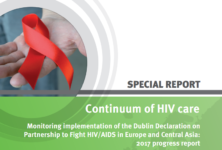Despite the prevalence of depression in people with HIV (estimates of up to 42%), few data exist on antidepressant efficacy in this population. Previous studies of depression in people with HIV have tended to be from American men who have sex with men. As a result, clinicians still are unclear about how antidepressants affect both men and women with HIV, and which agents are effective and work well with antiretroviral therapy (ART).
Although a recent global meta-analysis of 10 studies and 709 participants found antidepressants to be beneficial to people with HIV and depression, it could not definitively advise which specific antidepressants were most effective. Most of the studies were from the United States, and 7 of the studies had mostly male participants. Only 3 of the 10 studies compared different classes of antidepressants, so clinicians still do not know whether selective serotonin reuptake inhibitors are more effective than tricyclic antidepressants. Moreover, the studies did not assess the effect depression therapy had on patients’ virologic suppression.
“Now that ART is being provided early during HIV infection, it would follow that HIV-positive people suffering from depression are similar to HIV-negative people with depression in the same setting,” noted lead author Ingrid Eshun-Wilson, MBChB, MSc, an epidemiologist from Stellenbosch University in Cape Town, South Africa, in an interview with Infectious Disease Advisor.
How Major Depressive Disorder Affects HIV
In a 6-year study of 1494 patients with HIV with major depressive disorder (MDD), Arthur Owora, MPH, DrPH, found that the comorbid psychiatric illness could predict patients’ disease progression. Characteristics that predicted a low CD4 count included being male (adjusted odds ratio [aOR] 1.25; 95% CI, 1.03-1.52), being a minority race (American Indian [aOR 1.85; 95% CI, 1.38-2.49], African American [aOR 1.58; 95% CI, 1.33-1.87], Latino [aOR 1.52; 95% CI, 1.06-2.18]), and being divorced or separated (aOR 1.62; 95% CI, 1.16-2.28).
“Our study findings suggest that the pattern of MDD diagnoses, specifically, increasing frequency of illness over time, and not a diagnosis at any single point, predicts HIV disease progression,” explained Dr Owora, assistant professor of public health at Syracuse University in New York, in an interview with Infectious Disease Advisor. “Clinicians are encouraged to follow existing American Psychiatric Association [2010] guidelines with regular follow-up among depressed patients, instituting individualized therapies as needed and making appropriate referrals for social support. Appropriate treatment and care management can help curtail increasing recurrence of major depression and reduce risk of HIV disease progression.”
Now that ART has been simplified so that most people with HIV take 1 tablet daily, clinicians often forget about other complexities surrounding their care. An Australian study of 211 patients with HIV (89.5% men; median age, 47.2 years) found, however, that ostensibly healthy patients can develop serious physical and mental health comorbidities that predict poor outcomes. Patients with at least 1 mental illness had a higher odds ratio (OR) of being hospitalized (OR, 1.79; 95% CI, 1.22-2.62; P =.003) and had poor adherence to ART (OR, 2.34; 95% CI, 1.52-3.59; P =.001). More than half the patients in the study had ≥1 psychiatric illness, with one third having anxiety disorder and another third having major depression.
“Clinicians need to be aware that mental health problems are one of the most important reasons for failing to engage in long-term control of their virus,” said Don E. Smith, from the School of Public Health and Community Medicine, University of New South Wales in Sydney, Australia, in an interview with Infectious Disease Advisor. “Access to mental health services is an important part of HIV management. Simple management algorithms for common comorbidities such as hypertension, diabetes, [and] hypercholesterolemia are needed in all good HIV services.”
Depression can be a warning sign that patients with HIV may be abusing substances and engaging in risky sexual behaviors. In a Canadian study of 719 men who have sex with men, high depression scores correlated with substance use, which increased riskier sexual practices among men who have sex with men by 13-fold.
“Our findings highlight the need for better screening to identify concurrent patterns of substance use and mental health conditions,” explained lead author Kiffer G. Card, BSc, ABD, from the British Columbia Centre for Excellence in HIV/AIDS, Vancouver, British Columbia, Canada, in an interview with Infectious Disease Advisor. “This is particularly so, given our observation that individuals who have multiple concurrent health problems are more likely to engage in behaviors which might put themselves or their partners at risk for HIV.”
What the Young Might Teach the Old
A small study from the adolescent and young adult medical literature might suggest a way to provide sustainable and durable depression treatment. Brown and colleagues randomly assigned 44 patients with HIV (69% male; mean age, 21.5 years) and depression to a combination of cognitive behavior therapy and antidepressants or to treatment as usual, which was medication-only therapy. At the end of the 24-week treatment, patients who had combination therapy were more likely to achieve remission compared with their treatment-as-usual peers (65% vs 10%; P <.001), as measured by the Quick Inventory for Depression Symptomatology. At the 48-week follow-up, 71% vs 7% of patients in the combination therapy group and treatment-as-usual group were less likely to report depression, respectively.
“Often patients with depression are reluctant to try medication, even when it is recommended by their physician,” noted Larry K. Brown, MD, director of the Division of Child and Adolescent Psychiatry at Bradley and Hasbro Children’s Hospitals and professor and vice chair of the Department of Psychiatry and Human Behavior at the Alpert Medical School of Brown University, Providence, Rhode Island, in an interview with Infectious Disease Advisor. “This study found that referral to therapists was helpful in motivating patients to use strategies to improve their health, such as trying antidepressant medication and taking medicine to treat HIV. Physicians found that deciding about whether to begin, increase, or change medications was straightforward, using the medication framework and following the patient’s depressive symptom scores.”
Summary and Clinical Applicability
Although depression is common in people living with HIV, few studies have been performed to determine the efficacy of antidepressants in this population. The few studies that have been conducted in patients with HIV tended to come from men who have sex with men in the United States. More studies of antidepressants need to be conducted in other parts of the world and in both men and women with HIV.
By Suzanne Bujara


 ПОИСК ПО САЙТУ
ПОИСК ПО САЙТУ  поиск по ресурсному центру
поиск по ресурсному центру 

